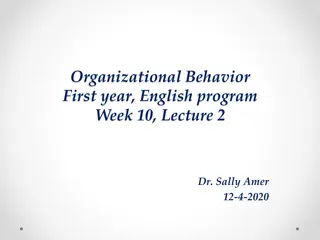Performance Development: Emotional Factors and Strategies
Understanding emotional factors in performance development, collecting relevant information, utilizing positive self-talk for emotional development, and the importance of monitoring and evaluating performance for continual improvement and targeted training. Visual aids complement the explanation of methods and approaches to enhance emotional aspects in performance development.
Download Presentation

Please find below an Image/Link to download the presentation.
The content on the website is provided AS IS for your information and personal use only. It may not be sold, licensed, or shared on other websites without obtaining consent from the author. Download presentation by click this link. If you encounter any issues during the download, it is possible that the publisher has removed the file from their server.
E N D
Presentation Transcript
Methods of Collecting Information. 5a). Explain why it is important to collect information about the emotional factor on performance before starting a development plan. It is important to gather information on the emotional factor before starting a development plan is so you can see what you need to improve by observing what your strengths and weaknesses are. One method to collect information o your emotional factor is by using a cause and effect chart. This is used to identify potential development needs within your performance and discuss potential effects on your performance. In this you start off by stating what your weakness was during the gam. eYou then give 3 possible reasons why your performance was like this, this should allow you to see what you need to improve in your emotion aspect of performance. This allows you to put your focus solely on your weakness.
Approaches to Develop. 1a). Explain the approach to develop the Emotional Factor. Positive self-talk as it is a good way to develop your emotional factor as it is allows you to talk in your head to your-self about things that have happened to you. It is like a running commentary on your own life so to speak. Sometimes you use positive self-talk without knowing that you are actually doing it. However, what you say to your-self can affect your performance positively or negatively depending if you use positive or negative words. You would use positive self-talk when your team are losing in football as you will start to become angry and you will need to control your anger so you do not shout at the ref or make a rash decision. You could being saying words that make you doubt yourself like don t make a mistake, don t miss the tackle, don t miss the penalty . Whereas you should being saying words like stay positive, make the tackle, lets score the penalty or look directly at the spot where you want the ball to go and say to yourself that s where it s going .
Recording, Monitoring and Evaluating. 5a). Explain the purpose of monitoring and evaluating your performance. It is important to monitor and evaluated your performance during your training programmes to allow comparisons to previous information gathered. This lets you identify what progress you have made and show your strengths and weaknesses within your performance. An example of this would be in badminton, after retesting it is clear to see that you are able to control your anger when you have be unable to perform an overhead clear to a high standard. Not being able to perform in the automatic stage of learning will have a negative impact on your performance as your opponent will easily be able to identify your weaknesses and take advantage of it, this is why it is important to control your emotions. Another reason to evaluate your performance is to allow you to adapt your training programme to ensure it is specific to your strengths and weaknesses. Adapting your performance will have a positive impact on your performance as it is specific to your targets and will let you reach your end goals that you have set at the beginning on your training programme.























